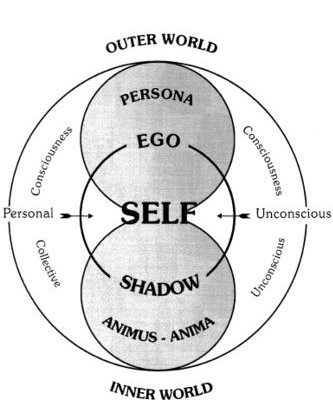One of the most profound psychologists of his time and a collaborator with Freud, until their parting of ways after determining neither would alter their concept of the psyche was, Carl Gustav Jung.
Jung’s conceptual structure of the psyche (as seen below) contains in it a concept that recognizes the underlying capacity for an individual to fall into a state of mind, and therefore a state of being, that is uncharacteristic of the individual and potentially evil by nature. This concept is referred to by Jung as “The Shadow”. The Shadow in Jungian psychology represents all the personality traits and characteristics about an individual that they consider negative and are likely to repress. This repression of “The Shadow” can cause serious trouble within one’s own psyche and may manifest itself through projection.
In contrasting the differences of Jungian and Freudian psychology you will find that, fundamentally, Jung took into account the human species’ history of mythology, religion, symbolism and many other attempts of the archaic man to understand the nature of reality and his own mind. This is not to say that Freud’s concepts and discoveries weren’t major contributions to the world of psychology, but rather, to point out that they may lack something highly important that shouldn’t go without a fair bit of contemplation.
To not consider our ancestor’s perception of the world and their attempt to layout a method of proper action therein, is tragic in some sense. In part by their failed attempts to aid our well-being and in part by our loss of knowledge and wisdom by our whimsical dismissal of their understanding. This can only be attributed to our arrogant belief in the mental processes adopted by the modern man as the only way in which to view the world, not as it is striped of its meaning in objectivity, for that it works very well, but in considering alternate yet still valid methods of perception of the world and reality as meaningful or symbolic. A better method of conceptualizing reality is to not dispense with the ideas of the past immediately, but to understand deeply and if possible incorporate the old with the new.


